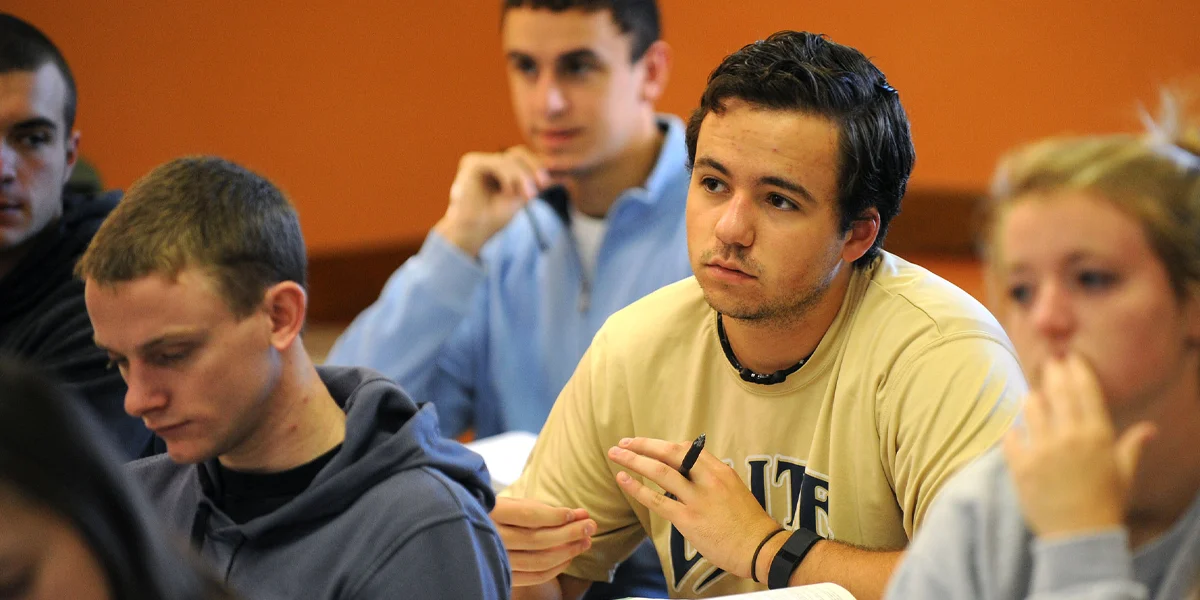Public Policy
- Bachelor of Science

-
In This Section
The Public Policy Program
The Public Policy program is designed to develop an understanding of the economic and political institutions, principles and processes involved in public policy decision-making. Students are led to examine issues critically while developing a substantive knowledge of market economics and democratic-constitutional government as the context for American public policy. Economic analysis and knowledge of political organization and politics comprise much of the intellectual framework for public policy decision-making. The curriculum combines courses in economics and politics to help foster the development of such skills and knowledge.
Undergraduate Programs
Undergraduate Admission
Phone:
800-782-5549
Ext. 2500
Email:
admission@stvincent.edu
What Can I Do With a Degree in Public Policy?
Public Policy majors primarily pursue law degrees and/or advanced degrees in public policy. Graduates with a public policy degree have gone directly into the fields of environmental services, management, news reporter, think tank and government.
Curriculum Requirements
-
Requirements for a Bachelor of Science Degree in Public Policy (45 Credits)
Requirements for a Bachelor of Science Degree in Public Policy (45 Credits)
BA 100 Financial Accounting I
BA 150 Managerial Accounting
BA 350 Statistics I
BA 350A Statistics I Excel Lab
BA 351 Statistics II
BA 351A Statistics II Excel Lab
EC 101 Principles of Economics: Micro
EC 102 Principles of Economics: Macro
EC 201 Microeconomic Theory
EC 202 Macroeconomic Theory
MA 109 Calculus with Applications I
CORE 1201 American Regime
PS 242 International Politics
OR PS 375 International Law
PS 295 American Political Thought
PS 345 Domestic Public Policy
PS 480 Senior Thesis (on a public policy topic)
Note: Public policy majors may not double major or minor in politics, economics or public administration. -
Requirements for a Minor in Public Administration
Requirements for a Minor in Public Administration.
For those majoring in Political Science, in addition to the major requirements, the following courses will be required:
EC 101 Principles of Microeconomics I
BA 102 Survey of Accounting
BA 150 Managerial Accounting
BA 170 Organizational Behavior
BA 350 Statistics I
BA 350A Statistics I Excel LabFor those not majoring in Political Science, 18 credits are required for the minor in Public Administration. The following courses will be required:*
BA 350 Statistics I
BA 350A Excel Lab
CORE 1201 American Regime
PS 345 Domestic Public Policy
BA 100 Financial Accounting I and BA 101 Financial Accounting II
OR
BA 102 Survey of Accounting
Choose two of the following:
BA 150 Managerial Accounting
BA 170 Organizational Behavior
EC 101 Principles of EconomicsVariations of the Public Administration program are possible with permission of the Dean of the McKenna School. A student choose, with the departmental advisor and with the consent of the Dean, a program designed to meet individual objectives.
*Students majoring in Business may not minor in Public Administration
Job Placements and Careers
-
Job Placements
Atlas Energy
Duquesne University
S. Forest Service
Westmoreland Agricultural Land Preservations -
Internships
Elg Metal
KDKA (TV)
Maryland Department of Environment
National Journalism Center in Washington, D.C.
Social Security Administration -
Graduate School Programs
Cal State Bakersfield
Carnegie Mellon University’s Heinz School
Dickinson Law School
Duquesne Law School
Georgetown Law School
University of Pittsburgh’s GSPIA and School of Law
Virginia Tech University
Faculty
Michael Urick, Ph.D.
Dean, McKenna School of Business, Economics and Government
Professor, Business Administration
michael.urick@stvincent.edu
Jason R. Jividen, Ph.D.
Program Chairperson
Associate Professor, Political Science
jason.jividen@stvincent.edu
Zachary Davis, Ph.D.
Associate Professor, Economics
zachary.davis@stvincent.edu
Robert DePasquale, Ph.D.
Professor, Business Administration
rob.depasquale@stvincent.edu
Jerome C. Foss, Ph.D.
Professor, Political Science
jerome.foss@stvincent.edu
Jeffrey Godwin, Ph.D.
Professor, Business Administration
jeff.godwin@stvincent.edu
Thomas Holowaty, Ph.D.
Associate Professor, Business Administration
tom.holowaty@stvincent.edu
Andrew R. Herr, Ph.D.
Professor, Economics
andy.herr@stvincent.edu
Rev. William J. Hisker, Ph.D.
Professor, Business Administration
bill.hisker@stvincent.edu
Gary Quinlivan, Ph.D.
Professor, Economics
gary.quinlivan@stvincent.edu
Undergraduate Programs
Undergraduate Admission
Phone:
800-782-5549
Ext. 2500
Email:
admission@stvincent.edu
